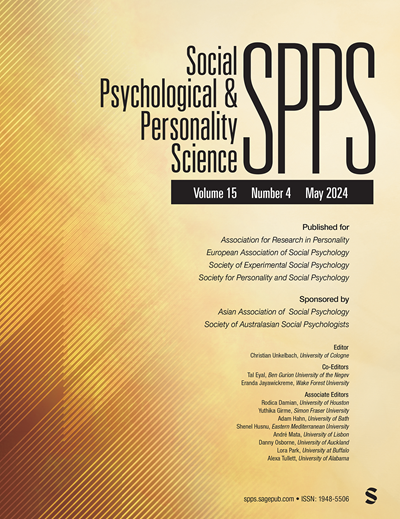在琐碎和有意义的情境中,感知到的自然性都会影响客观行为
IF 3.3
2区 心理学
Q1 PSYCHOLOGY, SOCIAL
引用次数: 0
摘要
研究表明,感知到的自然性会使人们对食物、人才和疫苗等物品的积极性产生偏差。然而,这些研究主要集中在自我报告上,因此对行为的影响尚无定论。在四项研究中(N = 492),我们测试了感知自然性是否会影响琐碎和有意义的行为。我们要求参与者饮用一种据称是天然/合成的功能饮料(研究 1),测试一种据称是天然/合成的药物(研究 2),食用含有据称会引起胃部不适的天然/合成可可的巧克力(研究 3),或选择一种据称由天然/合成墨水制成的贴纸(研究 4)。绝大多数参与者(66%-84%)选择了天然与合成选项,并坚持到底。在潜在后果很小(选择贴纸)到很大(注射毒品)的情况下,感知到的天然性会引导行为。自我报告可以较弱地预测行为,但结果显示,感知自然性以类似的方式对自我报告和行为产生了偏差。本文章由计算机程序翻译,如有差异,请以英文原文为准。
Perceived Naturalness Biases Objective Behavior in Both Trivial and Meaningful Contexts
Research shows that perceived naturalness can bias beliefs about the positivity of items such as food, human talent, and vaccines. Yet, this research focuses on self-reports, which leaves open the implications it has for behavior. In four studies ( N = 492), we tested if perceived naturalness impacts trivial and meaningful behaviors. Participants were asked to consume a purported natural/synthetic performance drink (Study 1), test a purported natural/synthetic drug that would be injected (Study 2), eat chocolate containing a purported natural/synthetic cocoa described as causing stomach discomfort (Study 3), or choose a sticker purportedly made with natural/synthetic ink (Study 4). A significant majority of participants (66%–84%) chose and followed through with the natural versus synthetic option. Perceived naturalness guided behavior in contexts involving little (sticker choice) to substantial (drug injection) potential consequences. Self-reports can weakly predict behaviors, but the results revealed that perceived naturalness biases self-reports and behaviors in a similar fashion.
求助全文
通过发布文献求助,成功后即可免费获取论文全文。
去求助
来源期刊

Social Psychological and Personality Science
PSYCHOLOGY, SOCIAL-
CiteScore
12.50
自引率
1.80%
发文量
77
期刊介绍:
Social Psychological and Personality Science (SPPS) is a distinctive journal in the fields of social and personality psychology that focuses on publishing brief empirical study reports, typically limited to 5000 words. The journal's mission is to disseminate research that significantly contributes to the advancement of social psychological and personality science. It welcomes submissions that introduce new theories, present empirical data, propose innovative methods, or offer a combination of these elements. SPPS also places a high value on replication studies, giving them serious consideration regardless of whether they confirm or challenge the original findings, with a particular emphasis on replications of studies initially published in SPPS. The journal is committed to a rapid review and publication process, ensuring that research can swiftly enter the scientific discourse and become an integral part of ongoing academic conversations.
 求助内容:
求助内容: 应助结果提醒方式:
应助结果提醒方式:


